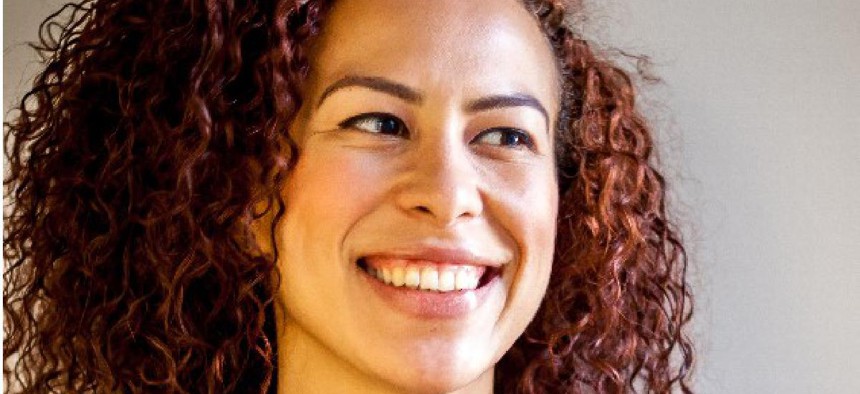Three personal practices for promoting racial equity

As a longtime activist, I have done extensive work around healing my own internalized anti-blackness. I suspect many of us have similar stories, and have thought of our work roles as separate from our personal identities. But as someone who was raised in a poor household and identifies as an immigrant, Afro-Latinx, and cisgender Queer woman, intersectionality has been at the center of my professional development – not only as an organizational development and leadership development consultant, but long before when I worked in youth development, education and fundraising.
I continue to experiment with transforming organizational cultures that favor the competencies of dominant identities, such as whiteness, so that I can both build trust and allyship with my white colleagues, and enable a collaborative and healing culture for all. Reflecting on my experiences working within an organization like Community Resource Exchange, which is intentionally working to create a more racially equitable culture and serves a widely diverse social sector, I have found three personal practices to be particularly successful and sustainable:
Vulnerability
One strategy that is working for me is practicing and modeling vulnerability by moving through my own discomfort and having the courage to cross the race boundary when examining and debriefing consulting interactions. This means sharing with white team members my racialized experience with clients both white and of color and inviting colleagues to do the same. Oftentimes, the assumptions made by white clients or colleagues, including microaggressions (subtle or unintended acts of discrimination against a marginalized group or member of that group), can feel unspeakable and only sharable with colleagues of color who are also recipients of microaggressions. Similarly, perceptions from clients of color of white colleagues being more capable can feel like betrayal and embarrassing to share with white colleagues. Sharing these experiences with white colleagues is an attempt to unfreeze and interrupt the norm of silence around the intersection of race and organizational life.
Building Relationships
Simply crossing the race boundary can start to feel exhausting when white colleagues are not able to empathize or “hear” the racialized experiences of people of color. To ensure my own self-care and sustainability when unpacking the multiple levels of racism at play, I take a “both/and” approach. In addition to building trust with white colleagues, I continue to prioritize sharing space with colleagues of color, especially black colleagues. This space can be built in both formal and informal ways: finding time on the calendar to meet with a colleague on a particular issue, or asking someone to head out of the office for a coffee. This practice helps me find the joy and grounding that I lose when conscious or unconscious microaggressions penetrate my professional armor. It allows me to externalize and let go of the rage that can ensue when these microaggressions become too frequent or overt to contain and process within and by myself.
Personal Reflection
Finally, I am continuing to make time for a consistent practice of individual reflection and development through journaling, movement and meditation, and intentional dialogue and unpacking dynamics with friends and colleagues. Reflection and personal recalibration are crucial in managing my energy and stamina in this work. I have noticed that those of us who come from historically marginalized communities and who are often most personally invested in racial equity work, might also be more likely to hold and express feelings of anger and frustration on behalf of our colleagues. I have found it worthwhile to pause and reflect on how this tendency might be showing up in myself or others on the team, and to create space for each of us to express, process and own our feelings if needed.
At the inaugural Mijente Convening in Chicago, I heard Paulina Helm-Hernandez, then co-director of Southerners On New Ground, say that “racial justice is healing justice.” This resonated with me in the deepest and most moving way. Those words have inspired me to integrate this concept of healing justice into all of my racial equity work, so that every one of us working in the nonprofit field has the space we need to be fully present and engaged with our work.
CRE is working on building its capacity for racial equity and creating a culture of inclusion that analyzes and breaks down traditional power dynamics that enable white dominant culture norms. We are working with external facilitators and doing our own internal organizational work to surface our collective vision of embodying racial equity as an organization. Many of us are also examining our individual roles around undoing racism at the intrapersonal and interpersonal level. We are honoring each other's personal journeys and lived experiences, and acknowledging our identities through an iterative process of becoming not just diverse, but truly inclusive.
These practices are based on my own experiences as a nonprofit professional and now as a consultant working with nonprofits. I encourage you also to pay attention to the practices that are working for you, keeping you energized and hopeful as you continue to achieve your purpose at work. As we continue to experience violence fueled by racial differences, it is up to each of us individually and as a whole sector to lead the charge to end white supremacy. This can be achieved through healing ourselves and leaning into trust and humanity with each other to build a new model of equity and inclusion in organizations with the hope of building a stronger and more equitable world for us all.
Yaro Fong-Olivares is an associate consultant at Community Resource Exchange. She has over 14 years of progressive experience in nonprofit management, leadership training, and wellness coaching, including strategy and organizational development, change management, sustainability, team effectiveness, diversity, inclusion and innovation.
